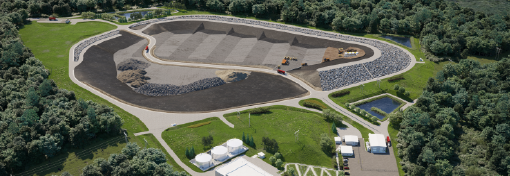Near Surface Disposal Facility – Chalk River Laboratories
The Near Surface Disposal Facility (NSDF) is a proposed engineered disposal facility for low-level radioactive waste at the Chalk River Laboratories site.
Transcript
The NSDF application to the CNSC
We’re the Canadian Nuclear Safety Commission, Canada’s nuclear regulator.
Our staff are reviewing the application from Canadian Nuclear Laboratories to build a Near Surface Disposal Facility (NSDF) in Chalk River, Ontario.
What does “near surface disposal” mean?
An NSDF is a type of waste facility where radioactive waste is stored at or below the ground’s surface.
In order to prevent contaminants from getting into the surrounding environment, the waste is placed in vaults or cells, with a special bottom liner.
This project would include 10 storage cells. When a cell is full, a cover will be placed on top to seal the waste and protect it from contact with people, animals and weather.
Protecting our water
We know there are concerns about the proposed Near Surface Disposal Facility affecting the Ottawa River.
That’s why over 50 specialized scientific and technical experts, like geoscientists and structural engineers, at the CNSC and across government are carefully reviewing every detail of CNL’s application, taking into account international best practices.
It’s their job to ensure the facility will meet Canada’s rigorous standards for protecting people and the environment:
They’re assessing protective materials planned for the facility, to ensure that the liner and cover systems contain and isolate the waste.
They’re studying water flows to ensure the impact on the Ottawa River would be negligible if small amounts of contaminants ever travelled to the river, both during operation and after the facility is shut down.
They’re also assessing whether the structure could withstand very severe earthquakes.
Like you, we want to protect the environment, so we all have clean water, air and soil — now and for future generations.
Learn more about how our experts are working to protect you and your community at nuclearsafety.gc.ca.

About the proposed facility
Information about the proposed NSDF facility in Deep River, Ontario.
Regulatory review status
Details on the regulatory review process and updates on timelines and proposal status.
Learn about the regulatory review status

Features
Page details
- Date modified:





